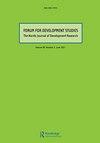西非埃博拉疫情期间冰岛民众对援助的看法
IF 1.1
Q3 DEVELOPMENT STUDIES
引用次数: 0
摘要
高收入国家对发展合作和人道主义援助的公共支持影响到官方发展援助的提供,以消除全球贫困并改善低收入国家的条件。这项研究考察了冰岛公众对官方发展援助的态度,2014年9月冰岛政府为抗击西非埃博拉疫情提供的援助就是一个很好的例子。具体而言,它考察了哪些特征与对援助持消极态度有关,以及公众认为哪些原因影响了提供援助的决定。冰岛大学社会科学研究所建立的一个互联网小组随机抽取了1500名成年人,对他们对埃博拉疫情的态度进行了问卷调查,920人回答了问题(61%的回答率)。四分之一的受访者对为应对埃博拉疫情而提供的人道主义援助以及总体发展合作表示消极态度。持消极态度的人更有可能在政治取向上倾向右翼,受教育程度较低。大多数公众认为,道德原因影响了提供人道主义援助的决定。对援助持负面态度的受访者更有可能认为,自身利益影响了提供援助的决定;然而,需要一个实验设计的调查来进一步阐明这个问题。各国政府应确保发展合作和人道主义援助除了教育公众了解发展进程外,还基于道德考虑,以提高对外国援助的积极态度。本文章由计算机程序翻译,如有差异,请以英文原文为准。
Public Opinion in Iceland on Aid During the Ebola Epidemic in West Africa
Abstract Public support in high-income countries for development cooperation and humanitarian assistance influences the provision of Official Development Assistance (ODA) to fight global poverty and improve conditions in low-income countries. This research examined public attitudes in Iceland toward ODA, with the aid provided by the Icelandic government in September 2014 to fight the Ebola epidemic in West Africa as a case in point. Specifically, it examines which characteristics relate to having negative attitudes towards the assistance, and what reasons the public believe influenced the decision to provide aid. A questionnaire about attitudes towards the Ebola epidemic was administered to a random sample of 1.500 adults from an internet panel established by the Social Science Research Institute of the University of Iceland, and 920 people answered (61 per cent response rate). A quarter of the respondents expressed negative attitudes towards the humanitarian assistance provided in response to the Ebola epidemic, and development cooperation in general. Those who held negative attitudes were more likely to lean to the right in political orientation and be less educated. The majority of the public believed ethical reasons influenced the decision to provide humanitarian assistance. Respondents with negative attitudes towards the aid were more likely to believe that self-interest influenced the decision to provide aid; yet, a survey with an experimental design is needed to elucidate this issue further. Governments should ensure that development cooperation and humanitarian assistance are based on ethical considerations, in addition to educating the public about development processes, to increase positive attitudes towards foreign aid.
求助全文
通过发布文献求助,成功后即可免费获取论文全文。
去求助
来源期刊

FORUM FOR DEVELOPMENT STUDIES
DEVELOPMENT STUDIES-
CiteScore
1.80
自引率
14.30%
发文量
24
期刊介绍:
Forum for Development Studies was established in 1974, and soon became the leading Norwegian journal for development research. While this position has been consolidated, Forum has gradually become an international journal, with its main constituency in the Nordic countries. The journal is owned by the Norwegian Institute of International Affairs (NUPI) and the Norwegian Association for Development Research. Forum aims to be a platform for development research broadly defined – including the social sciences, economics, history and law. All articles are double-blind peer-reviewed. In order to maintain the journal as a meeting place for different disciplines, we encourage authors to communicate across disciplinary boundaries. Contributions that limit the use of exclusive terminology and frame the questions explored in ways that are accessible to the whole range of the Journal''s readership will be given priority.
 求助内容:
求助内容: 应助结果提醒方式:
应助结果提醒方式:


